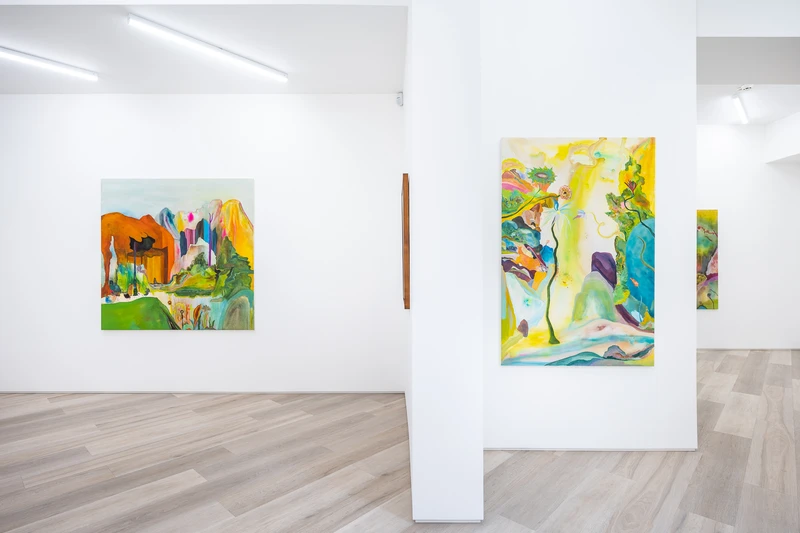Ross Taylor: Time of the Season
23 Jul-3 Sep 2022
PV 23 Jul 2022, 1-4pm


Taylor’s dreamlike, whimsical landscapes link the fantastical and every day, through an extraordinary use of colour and his remarkable technical prowess – these landscapes, possibly located somewhere between his native Britain and his adopted home of Australia, present a nostalgic, sentimentalized view of the natural world. The exhibition text (below) written by Australia-based arts writer and curator Angela Connor encapsulates the ideas and motivation that inspired this exhibition and we cannot wait for you to stop by the gallery and visit this spectacular series of works in person.
*Exhibition Text by Angela Connor, Curator & Arts Writer
Ross Taylor’s twelve new paintings of unpopulated and untamed landscapes are equal romantic visions and hometown odes. With techniques of soft washes and vivid hues, the works transport you into mystical universes, akin to the visions in Allan W. Watt’s The Joyous Cosmology (1962) or Tom Wolfe’s The Electric Kool Aid Acid Test (1968). With sumptuous yellows and lurid greens, Taylor’s paintings are resplendent in their candy-flipping visuals, inviting you on decadent, quixotic quests.
In his studio, Taylor paints with an eclectic mix of music in the background that imprints on his work. The title ‘Time of the Season’ is borrowed from psychedelic pop band The Zombies. Referred to as a counterculture anthem, the vocals are a call and response, a musical device that corresponds with Taylor’s invitation to the viewer ‘to re-imagine their ideas and experience of nature’.[1] I want to do right, but not right now, comes from the Gillian Welch song, Miss Ohio and takes a cue from the ‘hedonistic learnings’ of Taylor’s own youth.[2]
Taylor lives in the Macedon Ranges, a region in Central Victoria, Australia that is known for its native forests and sublime geological formations. While he draws inspiration from this environment, his landscapes are imagined, driven by intuition and shaped by his memory. Taylor builds worlds out of resonant feelings and his assemblages are intentionally fractured or distorted. They are new places made of old evocations. In The one’s we couldn’t be (2021), Taylor highlights how visual memory can be problematic. Highly saturated terrains overlap densely, emphasising their dream-like quality, embedding links to the Surrealist Movement. The foreground floats untethered to the background, suggesting that both planes may be unrelated, but are nevertheless melting together in a kind of luminous vista.
Taylor’s paintings challenge many of the conventions of the traditional landscape genre. His are not flat, pictorial locations. He is not overly concerned with staid portrayals of light cast realistically on a scene. His paintings are located in a kind of ‘moment under the moment’ between daylight and twilight, existing in a space of not knowing what will become. In his work Jungle Juice (2021), spritely flowers spawn sideways out of boulders and skies are set alight with vivid pink and acid green washes. While the works harness real forms from nature, Taylor uses these devices to a dizzying effect, directing the viewer’s eye around the picture surface and allowing colour to become the dominant force.
Influenced by the Fauvist style and 19th-century romanticism, Taylor’s paintings use colour unashamedly to draw an emotive response. His strident chromatic combinations begin on the floor with an eye-dropper. Dotting a mix of primary and fluorescent colours onto a wet canvas, he then rotates the canvas, allowing forms to appear. These nascent shapes become entry points and guides, as Taylor applies more deliberate marks and gestural brushwork. Abstract shapes and contours of rocks, mountains, rivers and shorelines emerge as Taylor forges new places to become both painter and Creator.
Within many of the canvases, Taylor positions himself metaphorically as a singular tree or flora. This personification is often highlighted in a fantastical manner and used to traverse his interior narratives. Old Songs New Lovers (2022) shows the transitional phase of blooming. A lone tree blossoms as the idle and red archaic rocks in the background watch on. The Space of our Longing (2021) foregrounds a large flower, with the surrounding vegetation growing upwards toward the light. Mother Tongue (2022), a brightly coloured seascape pays homage to the artist’s upbringing in Northumberland and to time spent with his mother on the north sea. Placed theatrically and as the protagonist, Taylor’s paintings operate as covert self-portraits.
It is only after the paintings are completed that Taylor bestows his titles, preferring the narrative to evolve wordlessly and organically throughout the process. This allows him to work with ‘autonomy and absolute freedom’, following no preconceived plan.[3] He titles the work, ‘not as the artist creating, but as the audience looking, like a final farewell to the work’.[4] Reflecting on numerous conversations, Taylor once said that artists have to find a subject that resonates universally and is inclusive of everyone. He has found that through the creation of magical spaces that infuse nature, a personal narrative and the surreal through a wily palette. He takes the traditional landscape and injects his own dancing individuality. His work looks back with nostalgia, and simultaneously forward with sanguine potential; to a dreamy future with love.
Angela Connor
Curator & Arts Writer